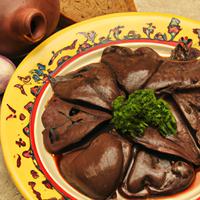
1 serving (100 grams) contains 168 calories, 26.1 grams of protein, 4.8 grams of fat, and 3.8 grams of carbohydrates.

Log this food in SnapCalorie

Nutrition Information
Calories |
400 | ||
|---|---|---|---|
% Daily Value* |
|||
| Total Fat | 11.4 g | 14% | |
| Saturated Fat | 4.0 g | 20% | |
| Polyunsaturated Fat | 0 g | ||
| Cholesterol | 1014.3 mg | 338% | |
| Sodium | 185.7 mg | 8% | |
| Total Carbohydrates | 9.0 g | 3% | |
| Dietary Fiber | 0 g | 0% | |
| Sugars | 0 g | ||
| protein | 62.1 g | 124% | |
| Vitamin D | 0 mcg | 0% | |
| Calcium | 19.0 mg | 1% | |
| Iron | 19.8 mg | 110% | |
| Potassium | 904.8 mg | 19% | |
* Percent Daily Values are based on a 2,000 calorie diet. Your daily values may be higher or lower depending on your calorie needs.
Food Attributes
Source of Calories
About Lamb liver
Lamb liver is a nutrient-dense organ meat celebrated for its rich, savory flavor and impressive health benefits. A staple in many Middle Eastern, Mediterranean, and British cuisines, lamb liver is often featured in hearty dishes like stews, pâtés, and pan-fried specialties. Packed with essential vitamins and minerals, it is an excellent source of iron, B vitamins (especially B12), vitamin A, and folate, supporting energy production, immune health, and vision. Lamb liver is also high in protein, making it a valuable choice for muscle growth and repair. However, its cholesterol and vitamin A content require moderation, particularly for those with specific health concerns. With its unique taste and robust nutritional profile, lamb liver can be an occasional addition to a balanced diet, offering a flavorful way to boost nutrient intake.



